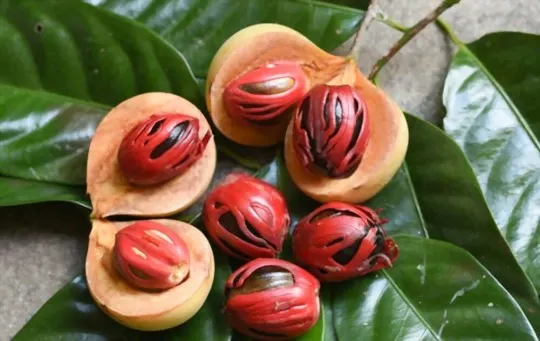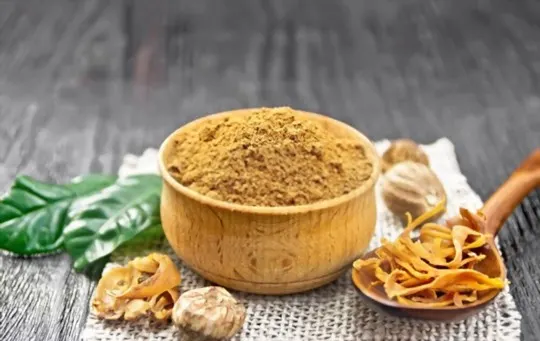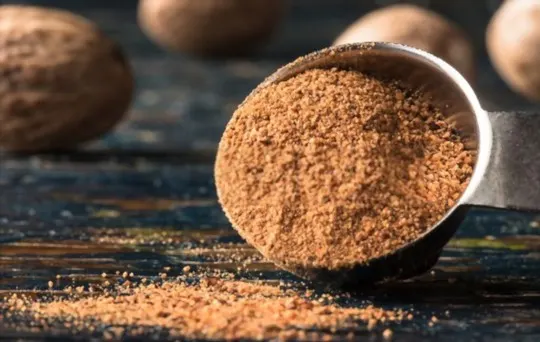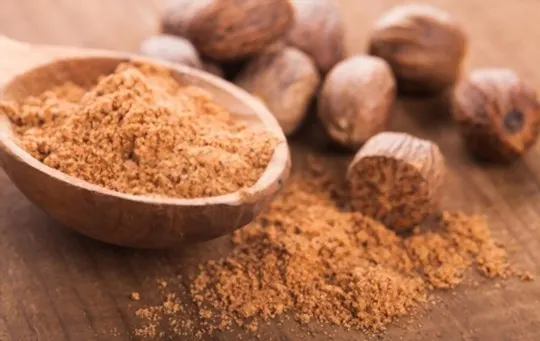Ever paused mid-recipe, nutmeg in hand, pondering the difference between its fresh and ground forms? We’ve all been there. It’s the kitchen dilemma we silently struggle with.
Nutmeg, that sneaky spice, changes the game from pod to powder. Here’s a fun fact: the fresher it is, the more it packs a punch. We learned this the hard way.
Remember the time we overdid it with the ground version? Our pumpkin pie tasted like a spice market explosion. Lesson learned. Fresh nutmeg is subtly more fragrant and less assaulting.
Ground nutmeg? Convenient yet a tad more muted. It blends in, no spotlight moments.
What is Fresh Nutmeg?

Fresh nutmeg refers to the whole nutmeg seed that has not been ground into a powder.
It has a hard outer shell that encompasses an edible kernel and possesses a strong aroma.
The difference between fresh nutmeg and ground nutmeg is primarily its shelf life, as fresh nutmeg lasts much longer than ground options due to its whole-state preservation.
Additionally, fresh nutmeg has a fresher flavor and can be grated to produce a fine powder when needed for culinary purposes.
When compared to pre-ground options, fresh nutmeg delivers high-quality flavors and adds rich spiciness to your cooking without any artificial essence or extras added.
What is Ground Nutmeg?

Ground nutmeg refers to the powdered form of the nutmeg seed that is commonly used in cooking and baking.
Obtained by grinding the whole nutmeg seed, it has a warm, sweet, and aromatic flavor that adds a unique taste to various dishes.
Unlike its fresh counterpart, ground nutmeg can be conveniently stored for long periods without losing its potency.
Its fine texture makes it easy to sprinkle into recipes or mix with other ingredients, making it a popular choice among chefs and homemakers alike.
Interestingly, the potency and intensity of ground nutmeg vary depending on how it is processed.
For instance, commercially available ground nutmeg may have added additives such as salt or sugar to enhance its flavor or prolong its shelf life.
On the other hand, freshly ground nutmeg may have a more intense aroma and flavor profile due to its natural oils that get released during the grinding process.
Therefore, when choosing between fresh nutmeg vs ground nutmeg, it is crucial to consider personal preference and culinary needs.
Differences Between Fresh Nutmeg and Ground Nutmeg

When looking at the differences between fresh and ground nutmeg, it’s important to note that both offer distinctive qualities.
Fresh nutmeg has a unique, intense flavor profile with sweet, woody notes while ground nutmeg is milder but still offers depth in taste.
However, fresh nutmeg can be difficult to grate and is often more expensive than ground nutmeg.
On the other hand, ground nutmeg typically loses its flavor faster due to oxidation.
So when choosing between the two, consider factors such as the dish you’re making and your personal preferences.
Source and Processing
The origin and production of nutmeg determine factors such as flavor, aroma, and texture.
Nutmeg is the seed of the evergreen tree whose fruit includes a red outer shell (mace) and a solid inner core (nutmeg).
Fresh nutmeg is extracted from ripe fruit, whereas ground nutmeg comes from dried fruits that have been powdered.
Extraction of fresh nutmeg manually can be time-consuming but can offer a strong flavor profile.
Ground nutmeg has a longer shelf life but may lack the potency and sweetness of fresher goods.
Flavor and Aroma
The essence and fragrance of Nutmeg is a function of how it’s been prepared.
Ground nutmegs are pre-ground and come in powder form, while fresh nutmegs are the unadulterated seed crafted from the fruit, with a higher flavor potency.
It all boils down to preference -whether you favor subtlety or intensified flavors.
Fresh nutmegs often have more complex flavors and aromas due to oils trapped inside the seed that release once grated, producing a deeper and more elegant flavor profile compared to ground nutmegs.
Shelf Life and Storage
The lifespan and preservation of fresh and ground nutmeg are different.
The storage time for fresh nutmeg is shorter as compared to the ground one.
Fresh nutmeg can last up to a month if stored correctly, whereas the ground form can enjoy a shelf life of over a year if it is appropriately stored.
It is essential to store both forms in an airtight container in a cool, dry place away from direct sunlight, heat and moisture.
This safeguards its quality and potency by preventing contamination or decay.
When you store ground nutmeg for an extended period, it loses potency due to evaporation and oxidation.
Therefore, freshly grating them just before use is recommended for superior flavour and effectiveness.
Freshly grated nutmeg will release volatiles, oils responsible for aroma and flavour into your dish that cannot be found in stored forms.
As such, buying whole nutmegs instead of pre-ground variants for cooking or baking purposes may be preferable.
To reap maximum benefits from either form of nutmeg; keeping them away from moisture should be top priority.
Humidity can cause the normally dry spice to clump together which could make it challenging to scoop out when you need it.
To avoid this issue, silica gel sachets or rice grains can be included close by when storing your spice collections.
The storage location plays a significant role in how long your spices remain fresh, so remember to avoid storing near heat sources like stoves or ovens that could expose them directly to heat radiation.
An ideal location may also be more on the basement shelves rather than kitchen cabinets because they tend to experience higher humidity levels regularly.
By being mindful of these details when storing your spices, you can ensure that they stay adequately preserved for longer while retaining excellent quality, taste, and aroma.
Ease of Use in Cooking
When it comes to cooking, nutmeg is a popular spice used in both sweet and savory dishes.
Its flavor and aroma are unique and can enhance various recipes.
However, the form of nutmeg you choose to use can impact your cooking efficiency.
- Ground nutmeg is easier to use in cooking compared to fresh nutmeg. Its powder form makes it easy to sprinkle into recipes, saving you time and effort.
- Fresh nutmeg requires grating before use, which can be time-consuming. Additionally, it has a stronger flavor than ground nutmeg so less of it needs to be used.
- If a recipe calls for freshly grated nutmeg, it’s best not to substitute ground as the flavors will differ significantly.
It’s essential to consider the type of dish you’re making and whether fresh or ground nutmeg would work better.
Ground nutmeg gives consistent results in baked goods that have evenly dispersed spice, while fresh nutmeg is more suited for savory recipes that require a punchy flavor.
Overall, the choice between fresh or ground nutmeg depends on personal preference and the recipe being cooked.
Understanding when and how each should be used can make all the difference in achieving your desired culinary creation.
Uses and Culinary Applications
Nutmeg is a highly versatile and commonly used spice in various culinary applications around the world.
When it comes to fresh nutmeg vs ground nutmeg, there are noticeable differences in their flavors, aroma, and texture that affect their usage.
Ground nutmeg is more commonly used because of its easy accessibility and convenience while cooking.
It has a finer texture and can be easily sprinkled or added to dishes.
Fresh nutmeg, on the other hand, has a stronger flavor and aroma than its ground counterpart.
It usually requires grating or grinding before use which makes it slightly inconvenient but worth it for the distinct taste.
Both types of nutmeg can be used in baking pastries, cakes, cookies, and pies.
Ground nutmeg can integrate smoothly with liquids like soups and sauces while fresh nutmeg works best for more robust flavors like meat dishes or hearty stews.
It is important to note that using too much of either variant can overpower the dish and create an unfavorable taste.
A little goes a long way when it comes to nutmeg usage.
Fresh Nutmeg Usage
Nutmeg is a versatile spice that enhances the flavor and aroma of various dishes.
It comes in both ground and whole form, but there are noticeable differences between them.
Here are the ways in which fresh nutmeg can be used:
- Add freshly grated nutmeg to cream-based sauces, soups, stews, and mashed potatoes to give them a warm and nutty flavor.
- Grind whole nutmeg berries for homemade spice mixes or rubs with other herbs like cinnamon, cloves, and coriander.
- Sprinkle freshly grated or ground nutmeg on top of coffee drinks like lattes or cappuccinos for an added depth of flavor.
- Use freshly grated nutmeg as a seasoning for savory dishes like baked chicken, roasted vegetables, or even macaroni and cheese.
Moreover, fresh nutmeg has a more intense aroma than its pre-ground counterpart.
It also holds up better over time since it retains its essential oils when stored whole.
Thus, using fresh nutmeg can elevate the taste profile of any culinary creation.
Ground Nutmeg Usage
Nutmeg is a versatile spice that can be used in both sweet and savory dishes.
Ground nutmeg is made by grinding whole nutmeg seeds, and it has a warm, rich, and fragrant flavor.
Here are some ways you can incorporate ground nutmeg into your cooking:
- Add a pinch of ground nutmeg to your coffee or hot chocolate for an extra boost of warmth and flavor.
- Sprinkle ground nutmeg over roasted vegetables, such as carrots or squash, to add depth and complexity to their flavors.
- Use ground nutmeg in baking recipes, such as pumpkin pie or spice cake.
- Mix it into your morning oatmeal or yogurt bowl for a cozy and comforting breakfast.
- Incorporate ground nutmeg into meat rubs or marinades for a subtle yet distinctive flavor.
- Add it to creamy sauces, like bechamel or alfredo sauce, for depth of flavor.
One unique aspect of ground nutmeg is that it retains its potency for much longer than freshly grated nutmeg.
This makes it a practical choice for keeping in your pantry and using whenever you need it.
However, if you have the opportunity to use fresh nutmeg, don’t hesitate.
It has a slightly different flavor profile than the dried version and adds an irresistible aromatic quality to any dish.
Recipes that Benefit from Fresh Nutmeg or Ground Nutmeg

Certain dishes require fresh nutmeg, while others benefit from ground nutmeg.
- Fresh nutmeg is best for recipes where you want a prominent and floral taste profile.
- Ground nutmeg is better suited for baking, stews, and dishes where the flavor can be absorbed more evenly.
- Using fresh nutmeg in baking, especially in large quantities, may overpower the dish.
- However, ground nutmeg may lack the same intensity of flavor that fresh nutmeg imparts.
It’s essential to understand which type of nutmeg a recipe calls for before proceeding with your dish.
Conclusion
Nutmeg is a popular spice that is used to add flavor and aroma to various dishes.
Whether fresh or ground, nutmeg brings a unique taste to your food, but there are significant differences between the two forms.
Fresh nutmeg has a more potent flavor and aroma than ground nutmeg since the essential oils in fresh nutmeg degrade when exposed to air.
While ground nutmeg has a longer shelf life and can be easily measured for recipes without any additional preparation, it can also lose its flavor with time.
Additionally, if you want to achieve maximum benefits from Nutmeg’s health-boosting properties, using fresh nutmeg is preferable as it retains more of its medicinal qualities than the pre-ground version.
Ultimately, which form of nutmeg you prefer will depend on your personal preferences and cooking needs.

Leave a comment